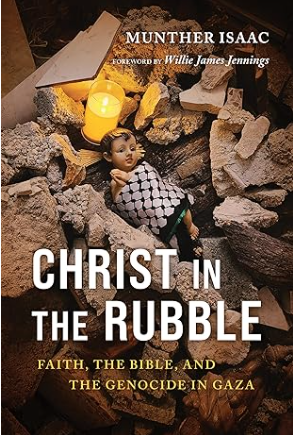
What if the Israeli-Palestinian war isn’t just a political dispute, but a colonial project with deep historical roots, and what if our understanding of Christian faith has led us to be complicit in the suffering of the Palestinian people?
Reverend Dr. Munther Isaac is a Palestinian Lutheran pastor and theologian. He is a director of the Bethlehem Institute for Peace and Justice at Bethlehem Bible College. His book Christ in the Rubble: Faith, the Bible, and the Genocide in Gaza was originally a Christmas sermon in 2023, and in 2025 it was made into a book. His book addresses the suffering of Palestinians and calls out some Christian leaders for their perceived complicity in the recent genocide in Gaza. Rev. Isaac includes a theological reflection on God’s solidarity with the suffering and a powerful image of a baby Jesus in the ruins of Gaza. He writes from Bethlehem with first-hand knowledge of conditions on the ground, and roots his commitment to nonviolence and just peace (3). In a lecture that he gave as described in the Wheaton Record, Isaac “was born in a reality of military occupation, a military occupation that defined every aspect of…life. Everything’s defined by that oppressive military.” Despite this, he and his community found strength and support through faith.
As a pastor, Rev. Isaac laments the fact that the genocide in Gaza is happening in real time before our eyes. He sees that Western Christians are tragically remaining silent and are playing a role in enabling genocide to continue. He asks: Why is the church silent? Why is the church neutral? Why is the Bible weaponized against Palestinians? (2, 234). He emphasizes the importance of taking a stand against injustice. Rev. Isaac argues that remaining neutral in the situation of conflict and oppression that is taking place in Gaza allows the oppressor to continue their actions without opposition and that silence in the face of suffering only emboldens the tormentor. Here, he highlights the moral imperative to speak out against the injustice done to Palestinians who are experiencing Israeli military occupation. Similarly, Rev. Isaac laments why some of his fellow Western Christians lecture the Palestinian Christians on international law and human rights. Still, when Israel, which is supported by U.S tax dollars, commits genocide, the Church in the West tells the Palestinians that it is not genocide. Rev. Isaac asks, Why is it being denied to Palestinians?
Struggling to find answers to his questions, Isaac argues that Western churches’ engagement with the Israeli-Palestinian war is shaped by three interconnected factors: coloniality, racism, and a problematic theology (103-132). He explains that the current situation is an extension of historical Western colonialism that shapes events in the region to serve its interests. This has resulted in a system of domination that has significantly impacted the lives of Palestinians. Next, he highlights the underlying racism and ideologies of supremacy, particularly in some expressions of Western thought and Christian Zionism that can contribute to the justification of violence against Palestinians. Rev. Isaac argues that the Western world has not adequately addressed its own history of antisemitism but has instead “exported” the problem to Palestine, blaming Palestinians and using them as a scapegoat. Lastly, Rev. Isaac critiques certain theological frameworks, particularly those linked to empire and Christian Zionism, which he believes can misrepresent the Gospel of Jesus and be used to justify violence and oppression. Rev. Isaac’s message is a theological reflection and a call for concrete action, urging Christians to speak out against injustice, advocate for a ceasefire, and seek ways to support the Palestinian people. He insists that genuine Christian solidarity must involve aligning with those who are oppressed, not those who inflict violence.
A main takeaway that Rev. Isaac posits is that colonial legacies, ingrained racism, and certain theological interpretations interact to influence Western churches’ responses to the conflict, sometimes leading to a contradictory or even complicit stance. The book urges readers to re-evaluate these factors and commit to a theology of justice that challenges existing power structures in solidarity with the oppressed. The book critiques Western church leadership for choosing “church diplomacy” (i.e, Rev. Isaac’s critique of churches that prefer to be neutral to avoid controversy, allowing the aggressor to continue their actions without challenge, essentially giving them implicit support). This book is a challenge that demands the awakening of the Western Churches to realign their beliefs and actions with Christ, who can be found not among perpetrators of violence, but with victims buried under the rubble of war. The book urges Christians to apply a critical theological lens to issues of colonialism, racism, and empire, particularly in relation to supporting policies that lead to the suffering of the Palestinian people. This book is a great tool for a pastoral and theological perspective on the war and genocide in Gaza.


One Response
Well, done, my Palestinian friend. I hope this stirs many to read this book in community, and welcome the changes in thought and practice for which Isaac pleads. I’m eager to be one of those people.